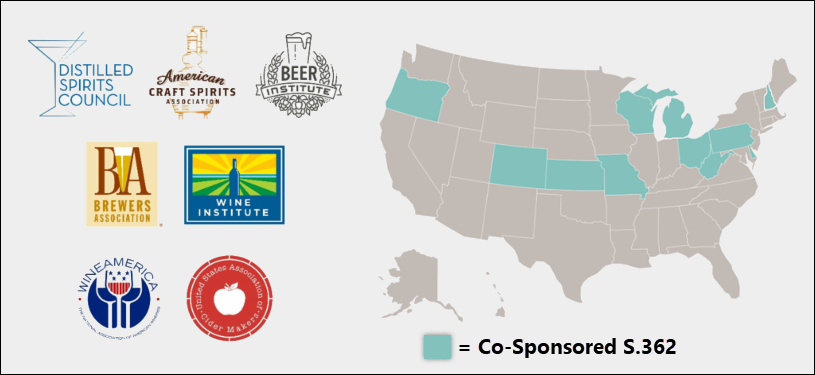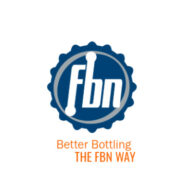
Though it seems like yesterday that distillers were raising a glass to celebrate the first lowering of the Federal Excise Tax since the Civil War it’s actually been nearly 15 months. On December 20, 2017, the United States Congress passed legislation that included a two-year provision of the Craft Beverage Modernization and Tax Reform Act – CBMTRA, which lowered the Federal Excise Tax – FET for breweries, wineries, and distilled spirits producers for a period of two years. That period started on January 1, 2018 and is set to expire on December 31, 2019. Tick, tock.
S.362 Introduced to Make the FET Reductions Permanent
On Feb. 6, 2019 Senators Ron Wyden (D-OR) and Roy Blunt (R-MO) re-introduced the Craft Beverage Modernization and Tax Reform Act (S.362) with the goal of making the lower FET permanent. The bill has strong support from a broad group of industry trade associations including the beer, wine, spirits, and cider sectors.
“People around the world enjoy Oregon wine, craft beer, cider and spirits—providing not only a serious source of home state pride but also a huge boon to our state’s economy,” Wyden said. “By modernizing burdensome rules and taxes for craft beverage producers, this legislation will level the playing field and allow these innovators to further grow and thrive.”
“The craft beverage industry is driven by small businesses that support thousands of jobs and contribute billions in economic output,” said Blunt. “This bill will remove tax and regulatory barriers that are making it harder for Missouri’s brewers, distillers, and winemakers to grow and compete. I’m encouraged by the strong, bipartisan support this measure had in the previous Congress and look forward to working with our colleagues to get it to the president’s desk.”
Stay Informed: Sign up here for the Distillery Trail free email newsletter and be the first to get all the latest news, trends, job listings and events in your inbox.
Industry Leaders Speak Out in Solidarity with One Voice
Leaders from the Brewers Association (BA), Beer Institute, WineAmerica, Wine Institute, Distilled Spirits Council, American Craft Spirits Association, and U.S. Association of Cider Makers agree that the legislation creates a more fair and equitable tax structure for beverage alcohol producers and their consumers. The legislation empowers these key economic players to continue to invest in their businesses and boost jobs across the country.


“Small and independent craft brewers are grateful for the ongoing bipartisan support for the Craft Beverage Modernization and Tax Reform Act,” said Bob Pease, president and CEO of the Brewers Association. “The legislation is not just economically smart but enables Main Street brewers to do what they do best: create and innovate. Our brewers can be found in every state and employ more than 135,000 Americans. They are at the heart of what makes small businesses so important to the nation’s greater economy. We remain hopeful that this legislation will be made permanent to support the small brewers of today and tomorrow.”
“I want to thank Senators Blunt, Portman, and Wyden as well as numerous members of Congress from both sides of the aisle and across the country for their continued commitment to providing excise tax relief to all of our nation’s brewers and beer importers,” said Jim McGreevy, president and CEO of the Beer Institute. “Since our nation’s inception, brewers and beer importers have been integral to our national fabric. Today, America’s beer industry continues to be a crown jewel in our nation’s manufacturing sector, supporting more than 2.2 million good-paying jobs and pouring more than $350 billion into the national economy. Making federal excise tax relief permanent for our nation’s brewers and importers will enable them to continue to innovate, invest in their businesses, support jobs, and give back to their communities.”
“The American wine industry generates more than $220 billion annually for the American economy through investments, jobs, tourism, and taxes,” said Jim Trezise, president of WineAmerica. “The Craft Beverage Modernization and Tax Reform Act enhanced our industry’s ability to contribute even more by channeling tax savings into purchases of new equipment, additional employees, increased wages, expanded distribution, and facility enlargements. The wine business is highly competitive, capital intensive, and labor intensive, so having extra funds available provides a real boost to our industry’s growth. We are deeply grateful for the original legislation, and respectfully urge that it be made permanent.”
“Without a doubt, CBMTRA is having the intended positive effect on wineries all over the country,” said Bobby Koch, president & CEO of the Wine Institute. “Wineries are using the tax savings to invest in the future growth of their businesses, and in doing so, are supporting their families, their employees, and their communities.”
“Regional-brand cider sales increased 22 percent last year, and more than 100 cideries opened their doors for the first time. Hard cider is now produced in 48 states. Much of the cider category’s growth is attributable to the excise tax credits these companies are now receiving,” said Michelle McGrath, executive director, U.S. Association of Cider Makers. “Small cideries are expanding their staff and operations in a direct response. The industrycan continue to support manufacturing, neighborhood renewal projects, rural economies, and orchardists, but we need these credits to stick around on a permanent basis to do so. Sunset clauses are no way to plan a business, and cider taxes are extremely complex—uncertainty makes navigating them even more challenging. We’re hopeful to once more see broad bipartisan support for making these credits permanent with the Craft Beverage Modernization and Tax Reform Act. The margins are so tight in cider that many family-owned cideries are literally depending on it.”
As of today, February 9, 2019, a dozen senators have signed on to support the bill. Here’s the full list as of right now.
[table “” not found /]Please help to support Distillery Trail. Sign up for our Newsletter, like us on Facebook and follow us on Twitter.














